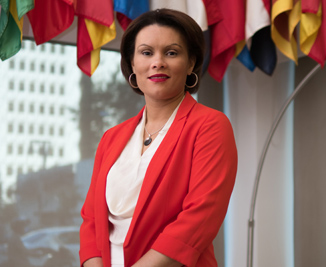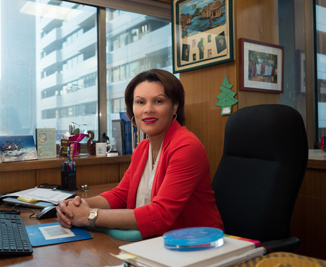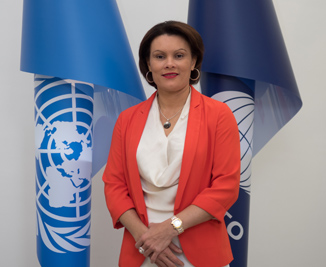You can also watch the interview here.
1,235,000,000. This is the number of international tourists moving around the world with a population of 7.4 billion people. This number increases annually by 4%, or 46 million people—the size of Spain. In 1950 there were hardly 25 million international travelers, and 75% of people had never gone outside their countries. In 1995 there were 527 million international visitors, and for 2030 the projections draw some 1,800 million travelers.
The total revenues derived from international tourism reach $1.26 billion—approximately Australia´s GDP— and accounts for 10% of global GDP if we include both indirect and induced income. International tourism creates 1 out of 10 jobs and accounts for 7% of global exports, making it the fourth largest export sector globally, after fuels, chemicals, and food. If we isolate services, tourism accounts for 30% of exports. It is one of the main sources of growth and foreign income for many developing countries, especially in Asia and sub-Saharan Africa, where the tourism sector grows at a rate of 11% per year, the fastest growth in the world.
But tourism is not only important for its economic weight. Tourists bring and take new ideas—both good and bad—with them, and the sector has an impact on other international issues, such as global security and global health. From an environmental perspective, tourists can be vectors for the propagation of invasive species that they take on their trips, harming indigenous biodiversity. They can accelerate the extinction of species when irresponsible tourists purchase souvenirs made of endangered animals and plants, participating in illegal trade. Additionally, global tourism contributes to 5% of greenhouse effect emissions causing climate change.
Since 1975, United Nations World Tourism Organization (UNWTO) fosters responsible, sustainable and universally accessible tourism, supporting the sector worldwide. Headquartered in Madrid, UNWTO is the only organization within the United Nations System managed from a Spanish-speaking country. Its new leader, M. Zurab Pololikashvili, who was previously the ambassador of the Republic of Georgia to Spain, Morocco, Algeria, and Andorra, will have to manage the challenges for the industry included in the organization´s strategy for Tourism in 2030.
Ms. Elcia Grandcourt is the Director of the Regional Program for Africa at the UNWTO; in this interview, she walks us through the new challenges and opportunities ahead for the organization and the future of tourism as a driver for African development.
Ms. Elcia Grandcourt, as Director of the Regional Program for Africa at UNWTO, can you tell us what are the mission and objectives of the organization and, specifically, of the program you lead?

As we are seeing more and more each day, tourism has become a powerful force for good for our world, critical to global advancement. UNWTO is the United Nations specialized agency in the field of tourism, responsible for the promotion of responsible, sustainable and universally accessible tourism, and we work with our member States to maximize the benefits of global tourism at the economic, social, cultural and environmental levels.
UNWTO promotes tourism as a driver of economic growth, inclusive development, and environmental sustainability, and offers leadership and support to the sector in advancing knowledge and tourism policies worldwide.
We encourage the implementation of the Global Code of Ethics for Tourism, to maximize tourism´s socio-economic contribution while minimizing its possible negative impacts, and is committed to promoting tourism as an instrument for achieving the Sustainable Development Goals (SDGs), geared towards reducing poverty and fostering sustainable development worldwide.
The organization generates market knowledge, promotes competitive and sustainable tourism policies and instruments, fosters tourism education and training, and works to make tourism an effective tool for development through technical assistance projects in over 100 countries around the world. Its membership includes 158 countries, six associate members and over 500 affiliate members representing the private sector, educational institutions, tourism associations and local tourism authorities.
In the context of the program, and as the Regional Director for CAF – the UNWTO Commission for Africa –, we work towards providing support to the 51 CAF members and key stakeholders from the region in their efforts to develop sustainable tourism as a driver for inclusive growth, job creation, and peacebuilding.
I am honored each and every day to be part of an organization that works on a daily basis for people and places across the globe.
What is the presence of the organization in Africa? Are there UNWTO´s regional field offices to monitor its action plans in the continent? If not, how is this lack of presence compensated?
UNWTO´s presence on the ground can largely be accounted through the various supports that the organization extends to its member states either on a political level or a technical level.
Our intervention, as an implementation agency on technical projects, ranges from the elaboration of tourism master plans, to strategic marketing plans, crisis communications, and management strategies or to the implementation of the Tourism Satellite Account. These initiatives are implemented with the support of several partners such as UNDP (United Nations Development Program) or the World Bank, which have the framework for country representation on the continent. Through this network, UNWTO is able to work closely with our member states and create synergies to deliver on our program of work.
Furthermore, there are several training and capacity building workshops and conferences that are organized on different themes in the region that also responds to members States requests, and it is through such platforms that allow for the exchange of knowledge and the sharing of experiences.
Tourism can be an economic driver for growth but, if it is not well managed, it has side effects in other dimensions as the social and the environmental ones. In order to promote the establishment of a balanced tourism industry, the UN has declared 2017 the International Year of Sustainable Tourism for Development. What is the specific agenda for Africa within the framework of this celebration?
The International Year of Sustainable Tourism for Development (IY2017) is a watershed moment for making tourism a catalyst for positive change. I am incredibly grateful for the yearlong opportunity IY2017 has given to the UNWTO, and our sector at large, to ensure that tourism truly works for the benefit of people and places worldwide.
The main IY2017 goals are as follows:
· Raising awareness on the contribution of sustainable tourism to development
Mobilizing all stakeholders in making the sector a catalyst for positive change
· Fostering change in policies, business practices and consumer behavior in tourism
In order to achieve these goals, UNWTO has identified five central pillars for the IY2017, which are key elements of sustainable development to which tourism stands to make a significant, lasting contribution towards the UN SDGs.
These are:
1. Sustainable economic growth
2. Social inclusiveness, employment and poverty reduction
3. Resource efficiency, environmental protection, and climate change
4. Cultural values, diversity, and heritage
5. Mutual understanding, peace, and security
These five areas are the ones in which tourism plays a major role and are complemented by the following action lines: advocacy and awareness raising; knowledge creation and dissemination; policymaking; capacity building and education.
With regards to Africa, all these strategic points materialize in initiatives as our flagship International Conference on Promoting Sustainable Tourism, a Tool for Inclusive Growth and Community Engagement in Africa, which will be held in Lusaka, Zambia, from the16th to the18th of November 2017.
In summary, the main message for Africa is that tourism can be a catalyst for development and competitiveness for the region and that such development needs to be done in full respect for nature, culture and local communities.

Tourism is an industry in which a lot of African countries relay in terms of economic growth, employment or in order to secure foreign currency. It is a very sensitive industry that does not react well to uncertainty. The threat of global terrorism, natural disasters, and climate change, or political unrest can have a negative impact on tourism. Is there a strategy to support the African member States of the UNWTO to communicate and react in a crisis situation?
Our world is currently experiencing periods of uncertainty, both at the political and economic level, due to the volatility of international markets and other external factors. Crisis can arise at any given time and place and are a global challenge that requires global solutions and increased cooperation.
The UNWTO has prepared a number of strategic and operational support vehicles to assist member States, including those in CAF, to help navigate and advance through these uncertain times. These include an increasingly utilized ´Toolbox on Crisis Communications in Tourism.
Tourism is a resilient sector that tends to show a particular capacity to rebound after crisis situations whether man-made or natural disasters. Still, in the short term, the impact of negative events in the sector can be very important. Crisis communications are in this sense a crucial element of good crisis management systems.
The toolbox is designed to serve as a catalyst when preparing a crisis communications plan. It can be used to form the basis of individual plans and be expanded according to the individual needs of each user, whether from the public or private sectors. It includes step-by-step protocols, checklists, sample templates configured by type of crisis and media categories, guidelines for measuring effectiveness, best practices and a special chapter fully dedicated to the use of social media in times of crisis.
UNWTO member States are able to customize this “Toolbox on Crisis Communications in Tourism,” a service that is offered to our member once they have signed the license agreement.
Additionally, we also support the member States on their request for crisis management strategies that are tailored to their demand.
Furthermore, in collaboration with the UNWTO/Themis Foundation, we organize training workshops on crisis management as we have done for the past consecutive years under the practicum program that takes place in Andorra, where the UNWTO/Themis Foundation is headquartered.
As an expert in tourism and the African continent, where do you see the main opportunities for growth in the sector?
As you know, tourism is a transversal sector that touches on different segments of an economy. With the right environment created, especially for young entrepreneurs and for the Micro, Small, and Medium-Sized Enterprises (MSMEs), this is one of the main growth areas.
The SMEs, play a major role in most economies, particularly in developing countries. According to the World Bank, formal SMEs contribute up to 60% of total employment and up to 40% of GDP in emerging economies. These numbers are significantly higher when informal SMEs are included.
The World Bank further estimated 600 million jobs will be needed in the next 15 years to absorb the growing global workforce, mainly in Asia and Sub-Saharan Africa. In emerging markets, most formal jobs are generated by SMEs: 4 out of 5 new positions. However, access to finance is a key constraint to SME growth. Without access to capital, many SMEs languish and stagnate.
Developing tourism products into tourism experiences requires a dynamic and skilled private sector and some degree of small-business support. For instance, Africa has almost limitless opportunities for the development of successful tour packages, and this is where opportunities abound for youth employment, for women empowerment and for experienced workers able to run and manage tour operations and support services for small entrepreneurs.
What is the role of the government and the importance of the private sector and international investors?
Tourism is a sector that is government-led and private sector driven and therefore the role of government is to create the appropriate climate with the right policy framework in order to be able to attract both the private sector and international investors to contribute to the economy of the sector.

The 22nd UNWTO General Assembly has chosen a new secretary general that will replace Mr. Taleb Rifai. What are the upcoming secretary general Mr. Zurab Pololikashvili´s orientations and perspectives toward the African members for this new period ahead?
Throughout his campaign, M. Pololikashvili has presented his statements for policy and management, with a focus on future opportunities and strategic changes that he envisions to bring to the organization. Mobilizing UNWTO regions worldwide, including Africa with its current 51 member States, is central to his vision for the growth of global tourism. In the specific case of Africa, the region is one of his priorities, and we envisage the development of a special program for Africa to shape this vision.
As a woman that can serve as a model for other women, especially in Africa, which message would you send to these African women following you? Which is the role that you think women must have in the future of the industry in the continent?
I have worked in tourism for most of my professional life. Tourism is in my blood, my heart, not just my mind. One thing I know for certain is that tourism is a sector that demands a lot of sacrifices and dedication. One has to be passionate about what you do and also to believe in yourself. Most importantly is to be positive and learn to get the best out of every opportunity that comes your way. Seeing nations gaining clarity and confidence in their tourism sector´s ability to transform the lives of their people thanks to the work of the UNWTO is deeply rewarding to me.
Hard work and determination brings fulfillment.
What is, for you, being an extraordinary woman? Do you consider yourself as an extraordinary woman?
I see ´extraordinary woman´—´extraordinary person´ after all—to be someone with whom society can identify, someone who brings inspiration to others. This person must have a clear leadership role, be it in the public or private sector. Must be a person that applies its energies to create a positive impact on others. Must be someone with good family values and sound work ethics that is able to balance both, professional and personal life, what for me matters most.
As for me being an ´extraordinary woman,´ I do not feel this is something one can define itself. It is something said by others. I, therefore, deflect this question to my children, my wonderful boys, who would be best positioned to tell whether I am an extraordinary woman as — besides UNWTO joys and challenges— the toughest and yet most rewarding job I have ever had is being a mum.
Alejandro Dorado Nájera. @DoradoAlex
Franck Olivier Kra. @FrankOKra
Photos: Stan Aron. @StanAronTweets
Deja una respuesta
Lo siento, debes estar conectado para publicar un comentario.